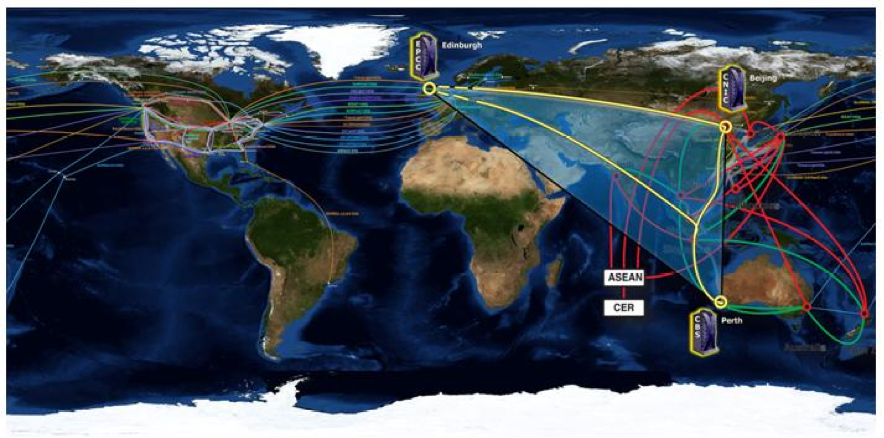The INWA (Innovation Node: Western Australia) grid links nodes on three continents, forming the longest grid in the world. This grid forms part of
an e-social science “collaboratory” focused on understanding regional socio-economic behavior in the context of global markets. Research councils and government and
industry in the UK and Australia, in collaboration with the University of Edinburgh and Lancaster University Management Schools, funded it.
Until recently, all INWA grid connections among participating sites in Europe, Asia and Australia went via the US to access high-performance international links
between national research and educational networks (NRENs). With the advent of TEIN2 (Trans-Eurasia Information Network), a 2.5Gb link is now available between
Europe and Asia, thus providing the INWA grid with a more direct alternative that is less than half the distance of the US route. TEIN2 has several points of presence
within the Asia-Pacific region (e.g., Beijing, Hong Kong and Singapore) providing direct connections to Europe’s GÉANT2.
URL:
www.gridtoday.com/grid/2180703.html
www.epcc.ed.ac.uk/projects/grid-computing/inwa
Collaborators:
UK:
University of Edinburgh’s Management School
Edinburgh Parallel Computing Centre
Lancaster University Management School
Australia:
Curtin University of Technology
Sun Microsystems Australia
China:
Computer Network and Information Center, Chinese Academy of Sciences
 Fig. 1: TEIN2 links (highlighted in yellow) connecting grid facilities in Australia, China and the United Kingdom. Each node is based on Sun servers, with servers based in Australia and Beijing provided as part of the collaboration with Sun Microsystems Australia. The TEIN2 network provides an important infrastructure for a region relatively poorly served by network connections in the research and education arena. In East Asia, the network reinforces economic ties established through free trade agreements, both in place (green) and in negotiation (red).
Fig. 1: TEIN2 links (highlighted in yellow) connecting grid facilities in Australia, China and the United Kingdom. Each node is based on Sun servers, with servers based in Australia and Beijing provided as part of the collaboration with Sun Microsystems Australia. The TEIN2 network provides an important infrastructure for a region relatively poorly served by network connections in the research and education arena. In East Asia, the network reinforces economic ties established through free trade agreements, both in place (green) and in negotiation (red).